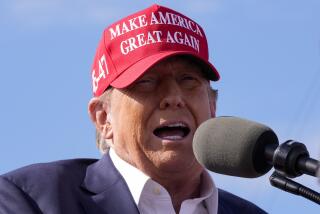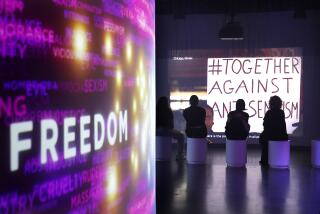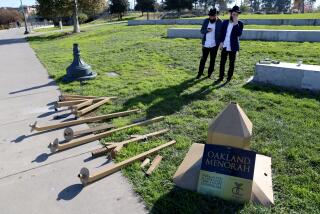Dinkins Is Target of Jewish Protests Over Verdict : Violence: Critics say N.Y. mayor shows lack of concern about anti-Semitic attacks. Others fear that the clamor adds to racial strife.
When a Brooklyn jury acquitted a black teen-ager of killing a Hasidic Jewish scholar last month, Mayor David N. Dinkins appealed for calm.
“I have no reason to doubt that in this case, the criminal justice system has operated fairly and openly in reaching this conclusion,” the mayor said, trying to ease tensions in a case whose outcome carried a strong potential for igniting racial unrest.
“Obviously, some will be disappointed with the verdict. But ours is a society of laws and, thus, a society requiring that we accept and abide by the decision of the jury system.”
But now, in a strange twist, Dinkins’ words are coming back to haunt him as some militant Jews, outraged by the jury’s decision, have made him the focus of their deep-seated anger and despair. Branding the mayor’s statement as evidence of his lack of concern about anti-Semitic violence, they have mounted an escalating series of protests against Dinkins that pose a growing threat to New York’s delicate racial balance and have the potential of becoming a major political liability for the mayor.
No matter how the verdict turned out, it was bound to set off shock waves.
But the repercussions were expected to be largely confined to the Crown Heights section of Brooklyn, a neighborhood where blacks and Hasidic Jews have long lived in an uneasy coexistence. That truce was broken when a visiting Hasidic scholar from Australia was stabbed to death last year during an outbreak of racial violence.
After the trial, the city anticipated trouble when the verdict was announced, and hundreds of police were deployed to Crown Heights. They were needed to quell the brief clashes and scattered incidents of violence--all relatively minor--that broke out in the neighborhood.
But the biggest surprise was the fallout from the Oct. 29 verdict that made Dinkins the target of some angry Jewish leaders. After all, Dinkins, the city’s first black mayor, had run on a platform of racial harmony. In fact, much of his political career has been spent supporting Jewish causes and speaking out against anti-Semitism in efforts to heal the city’s bitter racial and ethnic divisions.
But Jewish demonstrators, charging that Dinkins has shown insufficient outrage at the acquittal of the black teen-ager, held protest rallies vilifying the mayor and even staged a demonstration at Gracie Mansion, the mayor’s official residence, where they carried a coffin and “Wanted for Murder” flyers bearing Dinkins’ name.
Dinkins’ opponents also took out full-page newspaper advertisements denouncing the mayor and proclaiming that “in New York City, Jewish civil rights just don’t matter.”
In a further escalation of the war of words, they filed a lawsuit in federal district court in Brooklyn, charging that Dinkins and his former police commissioner, who also is black, purposely held back police during last year’s riots in Crown Heights so that “anti-Semitic criminals” could vent their fury against the neighborhood’s Jewish community.
Already, there are signs that the clamor against the mayor could resonate in next year’s mayoral election. Rudolph W. Giuliani, the former U.S. attorney who Dinkins narrowly defeated three years ago, stood on the platform with Hasidic community leaders at a rally in Crown Heights protesting the verdict.
City Council President Andrew Stein, who is expected to oppose Dinkins in next year’s Democratic primary, also has shown support for Dinkins’ critics.
“This is the most dangerous, flammable thing we have in this society--this race question,” said Richard Wade, a City University of New York graduate professor of urban history and political adviser to New York Gov. Mario M. Cuomo. “And I think Giuliani and Stein are making a mistake by attacking Dinkins like this.”
Cuomo has strongly defended Dinkins in the controversy since the verdict. “No one in this city’s history has tried harder nor done better in bringing people together, in seeking to avoid violence, in seeking to soften hate,” the governor said.
Last year’s racial rioting in Crown Heights erupted after a car in the entourage of a Hasidic Jewish spiritual leader went out of control and accidentally struck and killed a 7-year-old black child. Just hours later, Yankel Rosenbaum, a 29-year-old Hasidic scholar, was engulfed by rampaging blacks who shouted: “There’s the Jew--let’s get the Jew!” Rosenbaum was pounced upon, beaten, kicked, stabbed and then left bleeding to die.
“We are screaming for justice. We were grievously hurt,” said Rabbi Abraham Flint, a spokesman for the Crown Heights Jewish Community Council, which is spearheading the current attack against Dinkins. “In cases in which blacks have been victims, like the Bensonhurst case (in which a black teen-ager was killed by whites in a predominantly Italian-American section of Brooklyn) and the Rodney King case, the mayor has repeatedly criticized the verdicts. In this case, though, he rallies to the support of the jury.”
Lemrick Nelson Jr., the sole suspect in Rosenbaum’s death, was acquitted on Oct. 29, despite police testimony that he had a knife covered with the victim’s blood and was identified by Rosenbaum himself before he died.
But the jury, composed of six blacks, four Latinos and two whites, felt that Nelson’s attorney pointed out enough inconsistencies in the officers’ accounts to create a reasonable doubt as to the black youth’s alleged guilt. “The police were not honest,” one juror told reporters after the trial.
It was later revealed that, on the night after the verdict, Nelson’s attorney and the jurors celebrated and toasted one another at a victory dinner paid for by the lawyer. For Jewish New Yorkers angered by the verdict, it was like having salt poured into their wounds.
“Even if the jury felt it had saved Mr. Nelson from unjust punishment, its thoughtless celebration shows callousness toward the aggrieved Hasidic community and the family of Yankel Rosenbaum, a man who died the victim of racism and rage,” inveighed an editorial in the New York Times.
Alarmed by the racial polarizing over the issue, other Jewish leaders have rallied to Dinkins’ side and are exploring ways to defuse the crisis.
“The mayor is clearly being scapegoated, and scapegoated to a much further degree because he’s African-American,” said Sandy Frucher, a prominent real estate executive and past president of the local chapter of the American Jewish Congress. “The tragedy of the situation is that an honorable, decent, civil man is wasting an inordinate amount of time that could be better spent working with all the communities of this city to establish harmony.”
Several black community leaders, even some of those who have been among his biggest critics, also are coming to the mayor’s defense.
“It’s no secret that the mayor and this paper have not gotten along in the past,” said Andrew W. Cooper, publisher and editor in chief of the City Sun, an influential black weekly based in Brooklyn. “But at this point, I think it’s important for blacks to rally around him. I think he’s being victimized by the Hasidic community.”
Dinkins, meanwhile, has steadfastly defended himself against the charges brought by his critics.
“There is not a single shred of evidence that I held the NYPD back--and there never will be,” Dinkins said, in reference to the charges in the lawsuit. And, in an impassioned speech to black and Jewish religious leaders, he added: “And every time this utterly false charge is repeated, the social fabric of our city tears just a little bit more. It must stop.”
More to Read
Start your day right
Sign up for Essential California for news, features and recommendations from the L.A. Times and beyond in your inbox six days a week.
You may occasionally receive promotional content from the Los Angeles Times.






